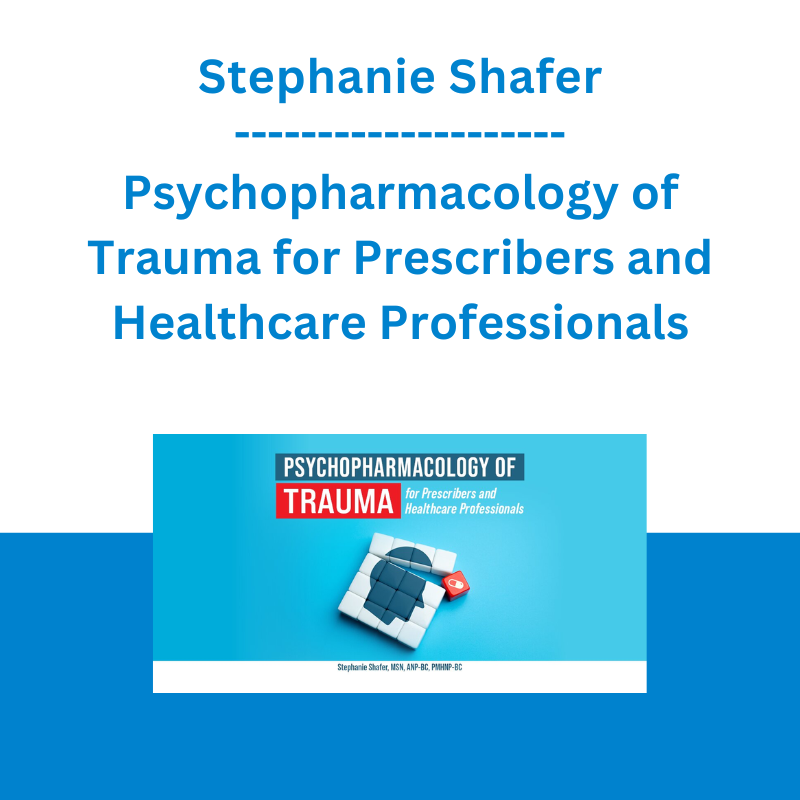*** Proof of Product ***
Exploring the Essential Features of “Stephanie Shafer – Psychopharmacology of Trauma for Prescribers and Healthcare Professionals”
Speaker: Stephanie L. Shafer, MSN, ANP-BC, PMHNP-BC
Duration: Full Day
Format: Audio and Video
Copyright: Jun 01, 2024
Media Type: Digital Seminar
Description:
You’ve seen clients and patients come in with a laundry list of medications and multiple diagnoses – PTSD, depression, anxiety and more.
Whether you’re a therapist, social worker, nurse or other healthcare practitioner knowing the in-and-outs of how trauma and comorbid mental health problems effect the brain and are impacted by medication is essential to your work.
In simple, easy-to-understand modules you’ll walk away with:
- In-depth knowledge to enhance communication with treatment teams
- Essentials of trauma’s impact on the brain and what it means for your work
- Mastery of how medications interact with neurotransmitters to better understand medication function
- Expertise on commonly prescribed medications, including side effects, benefits, side-by-side comparison of medications – including when and why they’re
- prescribed
- Conjunctive strategies, lifestyle interventions & more!
Give your clients and patients the highest standard of care – learn the psychopharmacology of one of the most challenging and common clinical presentations, trauma and its comorbidities.
Speaker:
Stephanie L. Shafer, MSN, ANP-BC, PMHNP-BC, works in a large private practice in Lansing, MI, providing clinical services to children, adolescents, and adults with psychiatric disorders, including ADHD, Bipolar Disorder, Depression, Anxiety, Obsessive-compulsive tendencies, Schizophrenia, Autism Spectrum Disorder, Traumatic Brain Injury, PTSD, and Personality Disorders. She has achieved considerable success treating these conditions. This success has largely resulted from the development of a structured model of care that includes a significant focus on clinical and background histories, identifying psychosocial stressors, and evaluating prior medical and psychiatric diagnoses (and treatment regimens associated with these conditions). This approach and model of medical management is essential to the effective delivery of psychiatric medications to this population.
From a clinical perspective, Stephanie has worked in a myriad of settings, including emergency medicine, primary care, and psychiatry, within a large urban hospital, community-based practice, clinics, and in a private-practice setting. Her transition from primary care to psychiatry evolved as a means of providing effective treatment for a growing population of underserved patients with psychiatric disorders.
Stephanie’s commitment to her specialty is evident. She completed a post-graduate degree specializing in psychiatry at Johns Hopkins University in Baltimore, MD, earned her Psychiatric Mental Health Nurse Practitioner certificate, and is a requested presenter, sharing her expertise with multidisciplinary healthcare audiences throughout the country.
Speaker Disclosures:
Financial: Stephanie Shafer is the owner and founder of Neurobehavioral Health and Wellness. She receives a speaking honorarium and recording royalties from PESI, Inc. She has no relevant financial relationships with ineligible organizations.
Non-financial: Stephanie Shafer is a member of the American Association of Nurse Practitioners.
Objectives:
- Determine foundational understanding of trauma including development and comorbidities.
- Identify framework for understanding how trauma impacts the brain development and function.
- Examine how neurotransmitters and medication interact and impact clients afflicted with trauma symptoms.
- Evaluate commonly utilized psychotropic medications, including adverse effects, applications,interactions and brain pathways utilized.
- Identify the basic mechanism of action as it relates to psychotropics from various classes.
- Compare current and newer treatments of PTSD, including psychedelics.
Outline:
Trauma epidemiology
Trauma
- Types of trauma
- Manifestations of trauma
Trauma and the brain
- Neurobiology of trauma
- Neurotransmitters and neurotransmission as it relates to medications used in trauma and other common comorbid conditions(i.e.: depression, anxiety, bipolar, personality disorders- borderline)
Psychopharmacology-
- Review of neurobiology in terms of medication MOA
- Discuss differentiating factors in terms of different classes of meds
Psychopharmacology- medications as they relate to PTSD
- Antidepressants in general and their use in PTSD
- Anxiolytics in general and their use in PTSD
- Mood stabilizers in general and their use in PTSD
- Antipsychotics in general and their use in PTSD
- Frequent manifestations of trauma and pharmacological treatments
Newer treatment options for PTSD such as ketamine and psychedelics
Non-pharmacological treatments used in conjunction with medications for PTSD
Please see the full list of alternative group-buy courses available here: https://lunacourse.com/shop/










 Emanuele Bonanni - My Trading Way
Emanuele Bonanni - My Trading Way  Atlas API Training - API 570 Exam Prep Training Course
Atlas API Training - API 570 Exam Prep Training Course  Erik Banks - Alternative Risk Transfer
Erik Banks - Alternative Risk Transfer  Forexmentor - Recurring Forex Patterns
Forexmentor - Recurring Forex Patterns